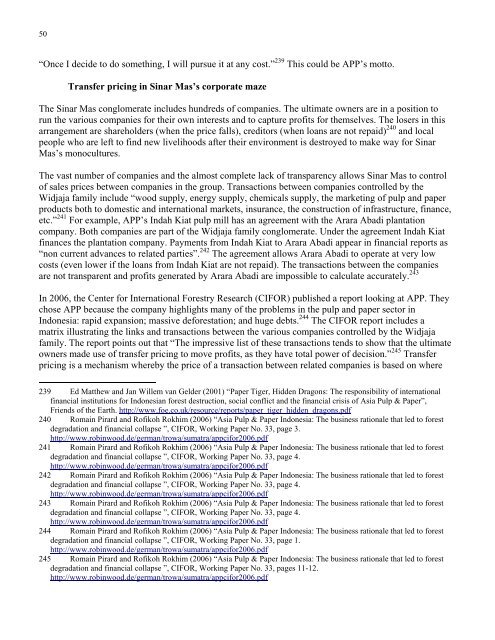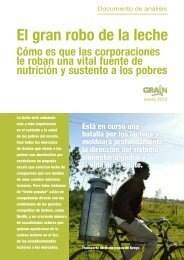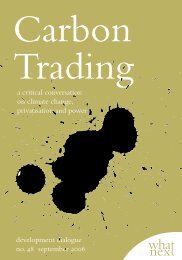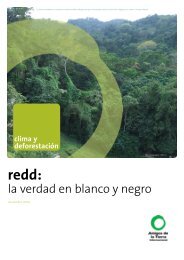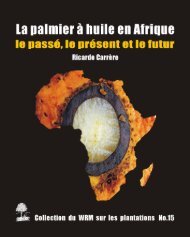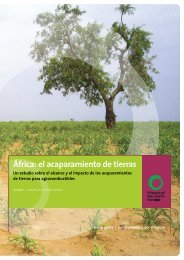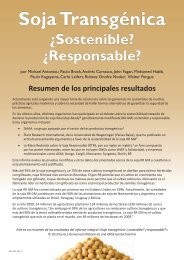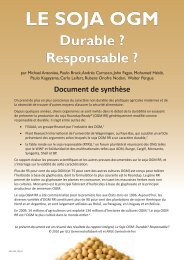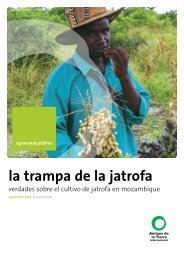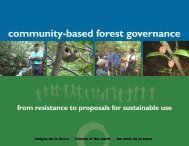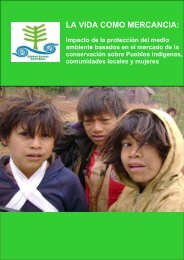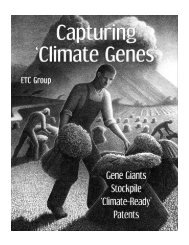Plantations, poverty and power - Critical Information Collective
Plantations, poverty and power - Critical Information Collective
Plantations, poverty and power - Critical Information Collective
You also want an ePaper? Increase the reach of your titles
YUMPU automatically turns print PDFs into web optimized ePapers that Google loves.
50<br />
“Once I decide to do something, I will pursue it at any cost.” 239 This could be APP’s motto.<br />
Transfer pricing in Sinar Mas’s corporate maze<br />
The Sinar Mas conglomerate includes hundreds of companies. The ultimate owners are in a position to<br />
run the various companies for their own interests <strong>and</strong> to capture profits for themselves. The losers in this<br />
arrangement are shareholders (when the price falls), creditors (when loans are not repaid) 240 <strong>and</strong> local<br />
people who are left to find new livelihoods after their environment is destroyed to make way for Sinar<br />
Mas’s monocultures.<br />
The vast number of companies <strong>and</strong> the almost complete lack of transparency allows Sinar Mas to control<br />
of sales prices between companies in the group. Transactions between companies controlled by the<br />
Widjaja family include “wood supply, energy supply, chemicals supply, the marketing of pulp <strong>and</strong> paper<br />
products both to domestic <strong>and</strong> international markets, insurance, the construction of infrastructure, finance,<br />
etc.” 241 For example, APP’s Indah Kiat pulp mill has an agreement with the Arara Abadi plantation<br />
company. Both companies are part of the Widjaja family conglomerate. Under the agreement Indah Kiat<br />
finances the plantation company. Payments from Indah Kiat to Arara Abadi appear in financial reports as<br />
“non current advances to related parties”. 242 The agreement allows Arara Abadi to operate at very low<br />
costs (even lower if the loans from Indah Kiat are not repaid). The transactions between the companies<br />
are not transparent <strong>and</strong> profits generated by Arara Abadi are impossible to calculate accurately. 243<br />
In 2006, the Center for International Forestry Research (CIFOR) published a report looking at APP. They<br />
chose APP because the company highlights many of the problems in the pulp <strong>and</strong> paper sector in<br />
Indonesia: rapid expansion; massive deforestation; <strong>and</strong> huge debts. 244 The CIFOR report includes a<br />
matrix illustrating the links <strong>and</strong> transactions between the various companies controlled by the Widjaja<br />
family. The report points out that “The impressive list of these transactions tends to show that the ultimate<br />
owners made use of transfer pricing to move profits, as they have total <strong>power</strong> of decision.” 245 Transfer<br />
pricing is a mechanism whereby the price of a transaction between related companies is based on where<br />
239 Ed Matthew <strong>and</strong> Jan Willem van Gelder (2001) “Paper Tiger, Hidden Dragons: The responsibility of international<br />
financial institutions for Indonesian forest destruction, social conflict <strong>and</strong> the financial crisis of Asia Pulp & Paper”,<br />
Friends of the Earth. http://www.foe.co.uk/resource/reports/paper_tiger_hidden_dragons.pdf<br />
240 Romain Pirard <strong>and</strong> Rofikoh Rokhim (2006) “Asia Pulp & Paper Indonesia: The business rationale that led to forest<br />
degradation <strong>and</strong> financial collapse ”, CIFOR, Working Paper No. 33, page 3.<br />
http://www.robinwood.de/german/trowa/sumatra/appcifor2006.pdf<br />
241 Romain Pirard <strong>and</strong> Rofikoh Rokhim (2006) “Asia Pulp & Paper Indonesia: The business rationale that led to forest<br />
degradation <strong>and</strong> financial collapse ”, CIFOR, Working Paper No. 33, page 4.<br />
http://www.robinwood.de/german/trowa/sumatra/appcifor2006.pdf<br />
242 Romain Pirard <strong>and</strong> Rofikoh Rokhim (2006) “Asia Pulp & Paper Indonesia: The business rationale that led to forest<br />
degradation <strong>and</strong> financial collapse ”, CIFOR, Working Paper No. 33, page 4.<br />
http://www.robinwood.de/german/trowa/sumatra/appcifor2006.pdf<br />
243 Romain Pirard <strong>and</strong> Rofikoh Rokhim (2006) “Asia Pulp & Paper Indonesia: The business rationale that led to forest<br />
degradation <strong>and</strong> financial collapse ”, CIFOR, Working Paper No. 33, page 4.<br />
http://www.robinwood.de/german/trowa/sumatra/appcifor2006.pdf<br />
244 Romain Pirard <strong>and</strong> Rofikoh Rokhim (2006) “Asia Pulp & Paper Indonesia: The business rationale that led to forest<br />
degradation <strong>and</strong> financial collapse ”, CIFOR, Working Paper No. 33, page 1.<br />
http://www.robinwood.de/german/trowa/sumatra/appcifor2006.pdf<br />
245 Romain Pirard <strong>and</strong> Rofikoh Rokhim (2006) “Asia Pulp & Paper Indonesia: The business rationale that led to forest<br />
degradation <strong>and</strong> financial collapse ”, CIFOR, Working Paper No. 33, pages 11-12.<br />
http://www.robinwood.de/german/trowa/sumatra/appcifor2006.pdf


